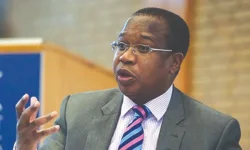Zimbabwe has decided to fight hard against smuggled goods entering the country. Finance Minister Mthuli Ncube wants to defend local businesses from unfair competition. The government says anyone selling alcohol, soft drinks, sugar, soap, or dairy items must prove they paid import taxes. If they can't show papers, officials will treat these products as illegal goods.
The authorities already started searching for smuggled products nationwide. They found fake items worth millions of dollars. Many shoppers like these goods because they cost less money. These products don't include taxes or import fees in their prices. But they hurt honest companies who play by the rules and pay their taxes properly. When legal businesses lose customers, they struggle to keep workers or pay taxes.
This creates big problems for the country. The government needs tax money to build roads, schools, hospitals, and other important things. Plus, many fake products can make people sick. Despite these issues, Zimbabwe expects its economy to grow by about six percent. Good farming results, strong mining, and more tourists helped reach this number. Most illegal items are sold through unofficial channels, which damages tax collection.
The government created new rules to make things fair. They added a five percent tax for wholesalers and manufacturers. They lowered the business size needed for tax registration from $40,000 to $25,000. The central bank started a program to help productive businesses borrow money cheaply. Small businesses must use card machines and connect their bank accounts to the tax office system.
Zimbabwe fights rising prices with strict money policies. These include changing interest rates and managing foreign currency through gold-backed money. The Finance Ministry spends money carefully to avoid printing extra cash. Because of these careful policies, they expect prices and exchange rates to stay stable. Since 2018, the government has changed many rules to collect more taxes and reduce budget shortfalls.
The country is discussing a new program with the International Monetary Fund. This should help steady the economy and fix debt problems. Zimbabwe faces many infrastructure challenges, such as bad roads, poor water systems, unreliable electricity, and not enough schools and hospitals. The Finance Minister says they are working hard to address these issues through various improvement projects.
The authorities already started searching for smuggled products nationwide. They found fake items worth millions of dollars. Many shoppers like these goods because they cost less money. These products don't include taxes or import fees in their prices. But they hurt honest companies who play by the rules and pay their taxes properly. When legal businesses lose customers, they struggle to keep workers or pay taxes.
This creates big problems for the country. The government needs tax money to build roads, schools, hospitals, and other important things. Plus, many fake products can make people sick. Despite these issues, Zimbabwe expects its economy to grow by about six percent. Good farming results, strong mining, and more tourists helped reach this number. Most illegal items are sold through unofficial channels, which damages tax collection.
The government created new rules to make things fair. They added a five percent tax for wholesalers and manufacturers. They lowered the business size needed for tax registration from $40,000 to $25,000. The central bank started a program to help productive businesses borrow money cheaply. Small businesses must use card machines and connect their bank accounts to the tax office system.
Zimbabwe fights rising prices with strict money policies. These include changing interest rates and managing foreign currency through gold-backed money. The Finance Ministry spends money carefully to avoid printing extra cash. Because of these careful policies, they expect prices and exchange rates to stay stable. Since 2018, the government has changed many rules to collect more taxes and reduce budget shortfalls.
The country is discussing a new program with the International Monetary Fund. This should help steady the economy and fix debt problems. Zimbabwe faces many infrastructure challenges, such as bad roads, poor water systems, unreliable electricity, and not enough schools and hospitals. The Finance Minister says they are working hard to address these issues through various improvement projects.












